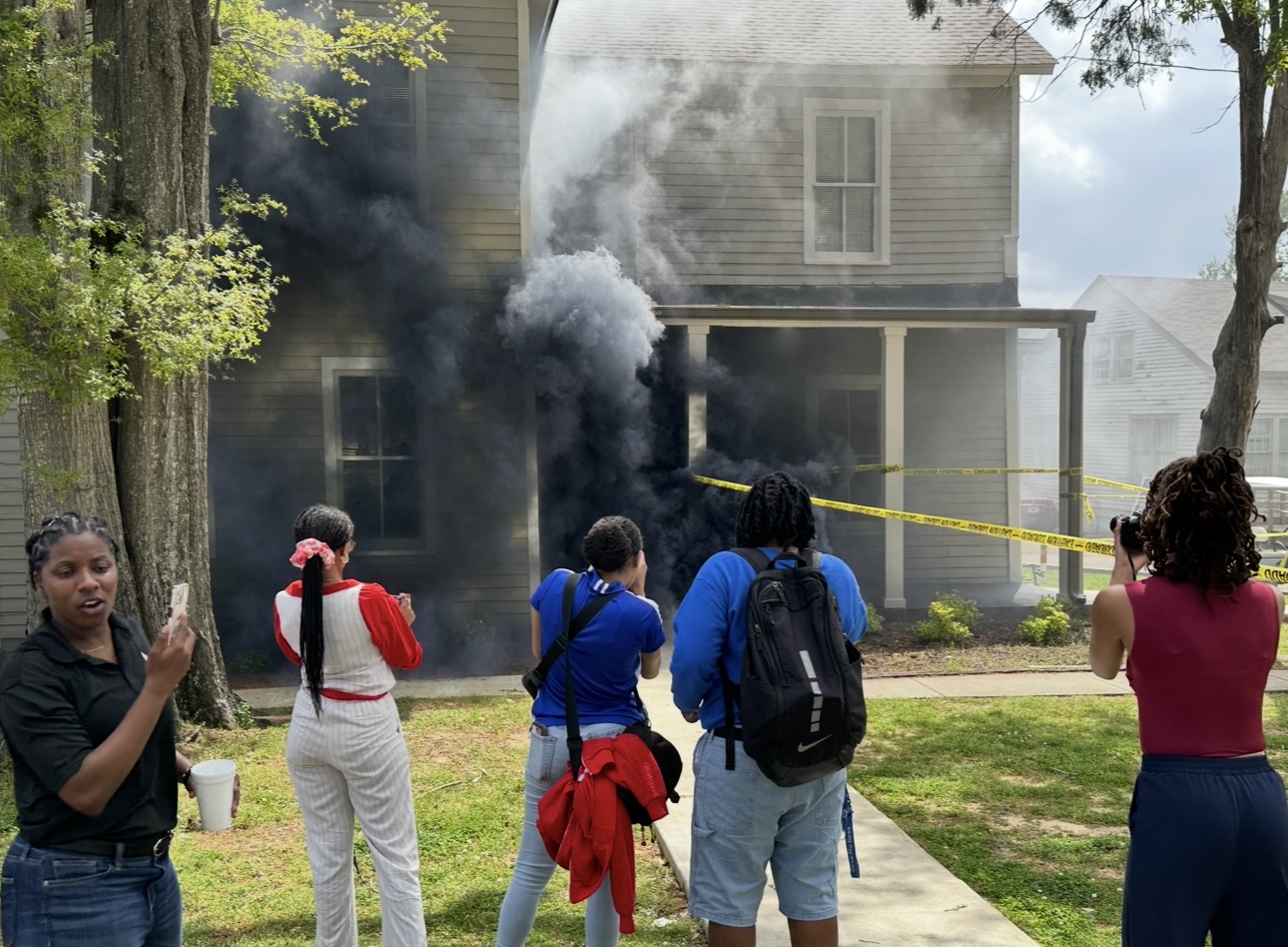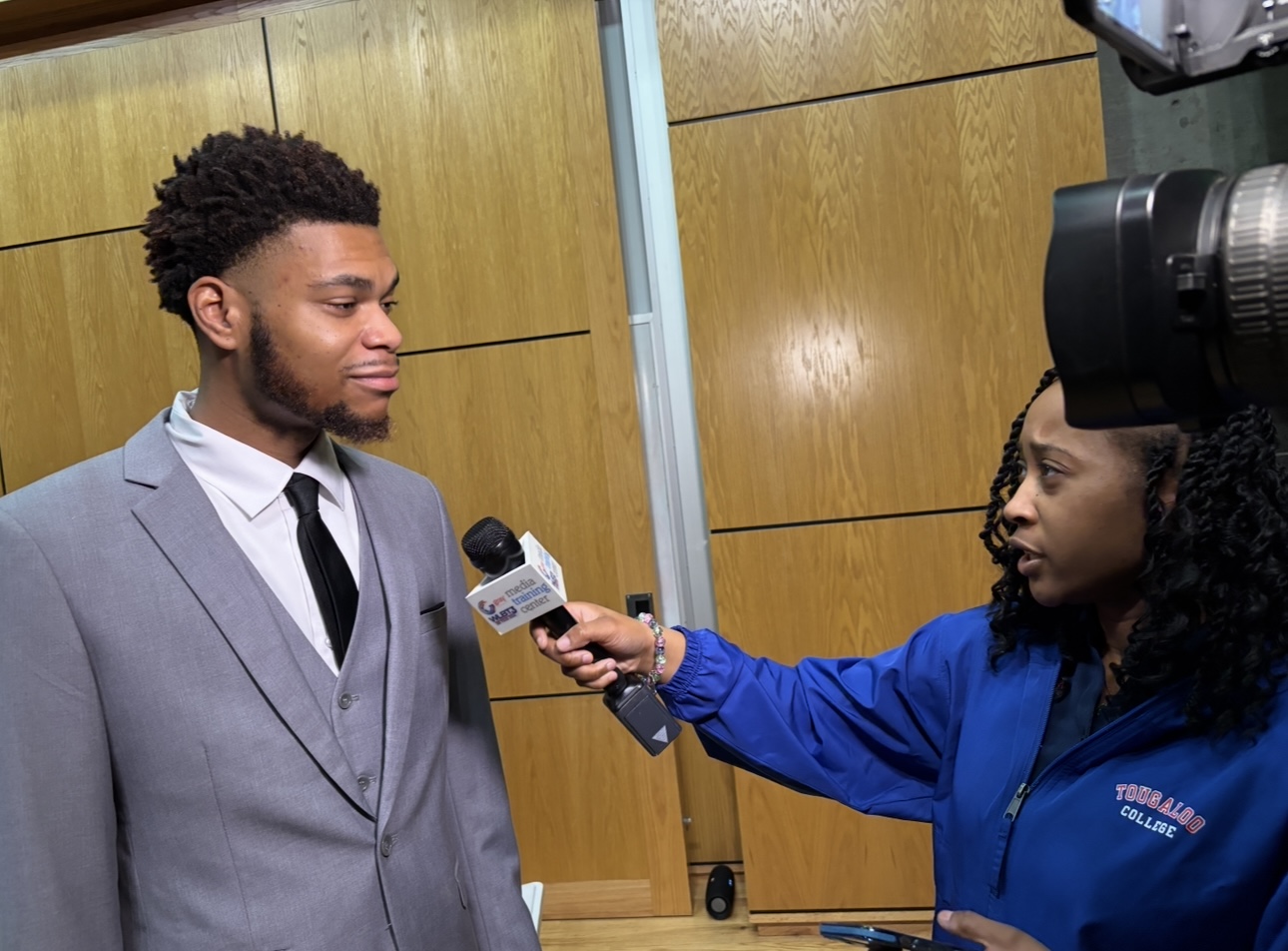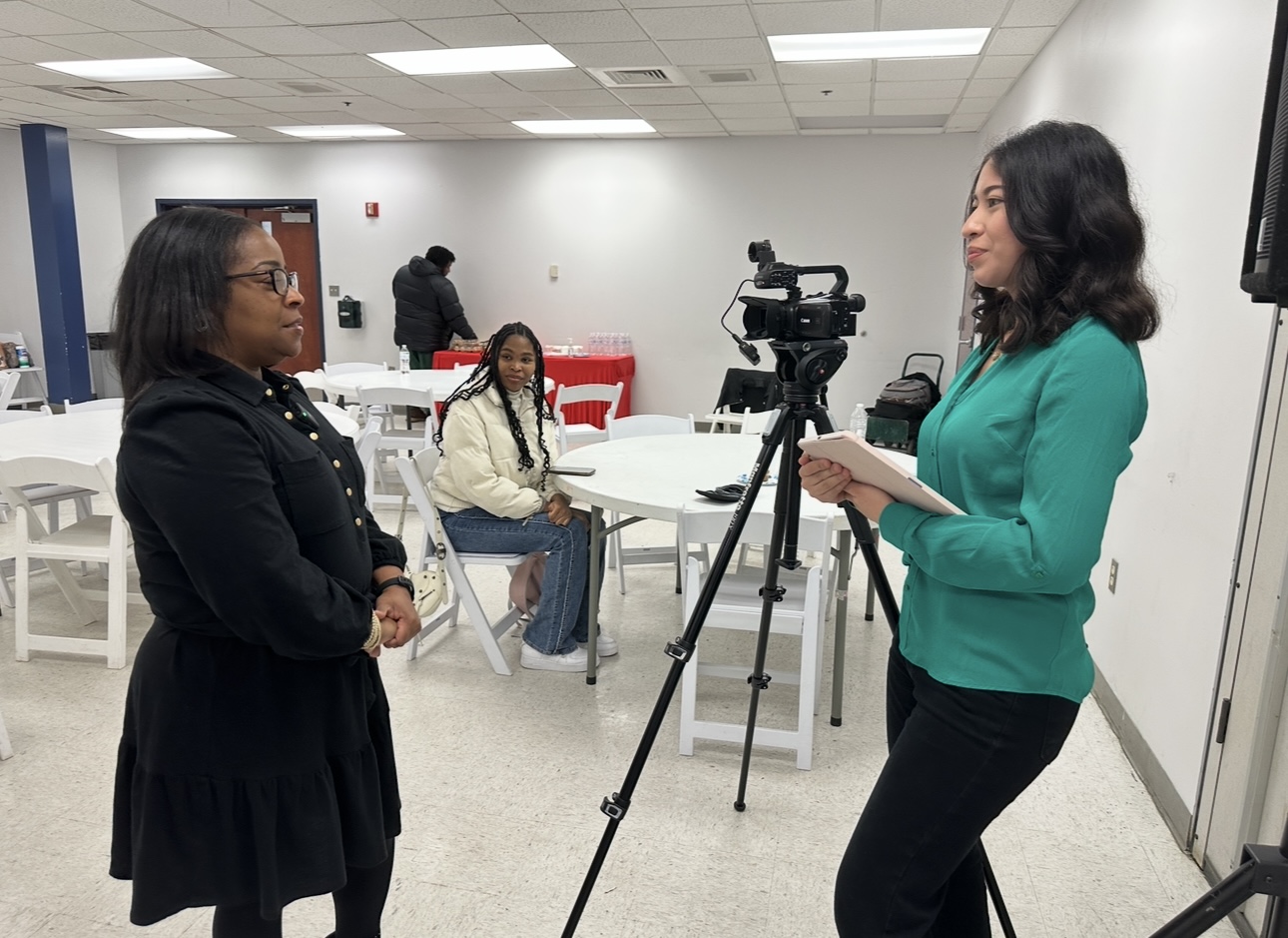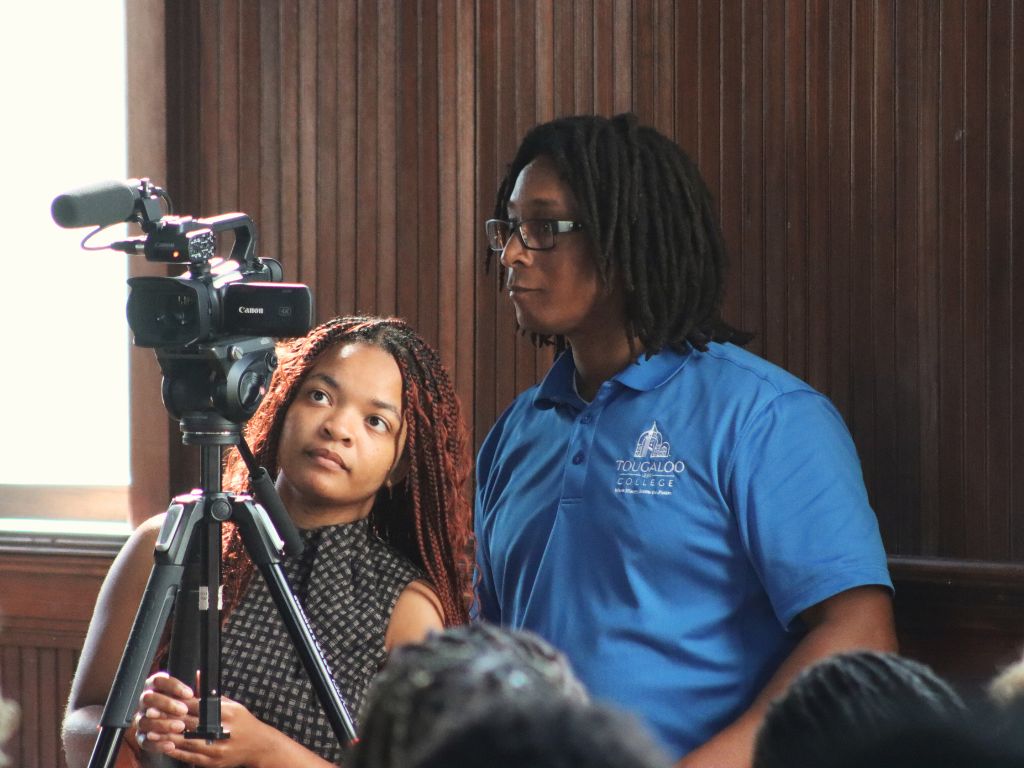Where Voices Rise and Stories Come Alive
The Radio and Television Broadcasting emphasis at Tougaloo College trains students to become skilled media professionals—on camera, behind the mic, and in the control room. From live reporting to studio production, students gain real-world experience in a dynamic, fast-paced environment. Whether your dream is to direct, produce, anchor, or create original content, this program equips you to shape narratives that inform, entertain, and inspire.
About the Program
The very hands-on, creative, and professionally-oriented Radio and Television major is up-to-date with the latest skills needed to master this field of study. If one chooses to make Radio and Television a major, the student will study the history, theory, criticism, and nuts-and-bolts production practices of radio, television, and film. In short, a student will learn how to create all manners of electronic media from scratch.
The goal of any Radio and Television program is to prepare the student for an entry-level position and, ultimately, a successful career in the media. Upon graduation, the student will be qualified to work for radio and television stations and a number of other fields. Tougaloo maintains its very own television station at which students can practice and gain expertise in all facets of media production.
Students majoring in Radio and Television may earn a Bachelor of Arts degree in Mass Communication with emphasis in Radio Television. Students are required to take all courses in sequential order. Students need a minimum of 124 semester hours for graduation.





Course Requirements
To earn the B.A. in Mass Communication – Radio and Television Broadcasting Emphasis, students must complete 124 total credit hours distributed across core mass communication courses and specialized broadcasting courses.
COURSE DESCRIPTIONS: MASS COMMUNICATIONS
This course is a survey of the development and the operation of print and electronic media including an overview of mass communication theory and effects research. The course is designed to provide students with a broad understanding of the media industry and professions in the mass media.
CREDIT: THREE SEMESTER HOURS
This course is designed to familiarize the student with various theories of mass communication. Students will understand the evolution of theories in mass communication and discover how theories of mass communication apply to everyday life.
CREDIT: THREE SEMESTER HOURS
This course will introduce students to the basic concepts of news writing for print and electronic media. The course will equip the students with skills needed in understanding the principles, differences, and similarities in writing for print and electronic media.
CREDIT: THREE SEMESTER HOURS
The purpose of this course is to prepare students to work in the media industry by improving specific communication skills. Vocal weaknesses will be evaluated and students will be provided the necessary tools help improve their speech patterns and voices. Students will be introduced to the International Phonetic Alphabet and will practice skills by engaging in mock communication exercises related to Mass Communication.
CREDIT: THREE SEMESTER HOURS
This course is designed to give students training and experience in recognizing and gathering information worthy of news and feature stories as well as the art of reporting, content, including video and still photography, for the students media website will be incorporated in the class. Course work will also be used to produce the student newspaper and other student media projects.
CREDIT: THREE SEMESTER HOURS
This course is designed to give students training and experience in recognizing and defining news, news gathering and news writing. Course work will be used for the student newspaper and other student media projects.
CREDIT: THREE SEMESTER HOURS
The purpose of this course is to assist the student in understanding research and writing as it relates to the field of mass communication. Students will investigate work by scholars in the field and will also be introduced to the tools needed in order to conduct their own research and write the results. This course prepares the student for further study within the department, for the senior project, and for study beyond the Bachelor's degree in mass communication.
Prerequisites: ENG 101, ENG 102, COM 101, 111, 112, 113, 114 & 115
CREDIT: THREE SEMESTER HOURS
This course is a survey of the ethical aspects of the mass media. The course prompts students to consider their roles as media practitioners and the ethical issues that arise.
Prerequisites: ENG 101, ENG 102, COM 101, 111, 112, 114, 115 & 211
CREDIT: THREE SEMESTER HOURS
This course is a general study of legal history and the application of specific laws as they apply to the mass media in the Unites States. Issues such as libel, invasion of privacy, indecency, obscenity, etc., will be investigated through the course. Offered once per year in alternate odd years.
Prerequisites: ENG 101, ENG 102, COM 101, 111, 112, 113, 114, 115, 211 & 212
CREDIT: THREE SEMESTER HOURS
This course will assist the student in developing skills in evaluating the use of graphics for promotional media in mass communication. The student will learn to critically assess campaign needs and analyze visual components for effective message communication using graphic editing software.
Prerequisites: ENG 101, ENG 102, COM 101, 111, 112, 113, 114, 115, 211 & 212
CREDIT: THREE SEMESTER HOURS
This course will teach students about the basics of still photography for use in mass communications, with emphasis on advertising, public relations, journalism and broadcasting. The latest digital photographic techniques will be employed, including digital still cameras and digital darkroom software. This course also focuses on how mass communication professionals make their own photographs suitable for publication in newspapers, magazines and other publications.
Prerequisites: ENG 101, ENG 102, COM 101, 111, 112, 113, 114, 115, 211, 212 & 312
CREDIT: THREE SEMESTER HOURS
Upon completion of all other core requirements and requirement for the emphasis area, students will work for a professional mass media organization under the direction of the instructor and the guidance of media personnel. This course may be taken twice.
Prerequisites: All 100, 200 and 300 level courses
CREDIT: THREE SEMESTER HOURS
This course examines the theoretical aspects of persuasion in the media. Students will be introduced to theory, principles and tactics by which persuasive messages are developed and conveyed. Additionally, students will gain the ability to recognize and critically analyze persuasive attempts in the media.
Prerequisites: All 100, 200, & 300 level courses
CREDIT: THREE SEMESTER HOURS
This course will encourage the students to think critically about the role and the impact of the media in contemporary society by examining the media industry, media content, media consumption and emerging technologies. Additionally, students will consider controversial issues surrounding the mass media.
Prerequisites: All 100, 200, & 300 level courses
CREDIT: THREE SEMESTER HOURS
This is a special topics course which will explore current issues in mass communication. Topics will alternate each time the course is offered.
Prerequisites: All 100, 200 and 300 level courses
CREDIT: THREE SEMESTER HOURS
COURSE DESCRIPTIONS: RADIO AND TELEVISION BROADCASTING
This course prepares students to present for broadcast media and emphasizes oral presentation, field reporting, audio and video recording techniques, and news programming formats.
Prerequisites: ENG 101, ENG 102, COM 101, COM 111, COM 112
CREDIT: THREE SEMESTER HOURS
Focused on preparing news stories for broadcast, this course includes field reporting, writing, editing visual and audio content, and performing for on-air presentation.
Prerequisites: COM 101, COM 111, COM 112, COB 111
CREDIT: THREE SEMESTER HOURS
Introduction to key components of production for electronic media. Students develop basic audio and television production skills and learn relevant software and terminology through hands-on practice.
Prerequisites: COM 101, COM 111, COM 112
CREDIT: THREE SEMESTER HOURS
This course explores the producer's role and program structure as they relate to daily broadcast production operations.
Prerequisites: COM 101, COM 111, COM 112, COB 111, COB 211
CREDIT: THREE SEMESTER HOURS
This course provides an understanding of programming departments in broadcast stations. Students examine programming issues across media entities and evaluate the audience appeal of television programs.
Prerequisites: COM 101, COM 111, COM 112, COB 111, COB 112, COB 211, COB 212
CREDIT: THREE SEMESTER HOURS
